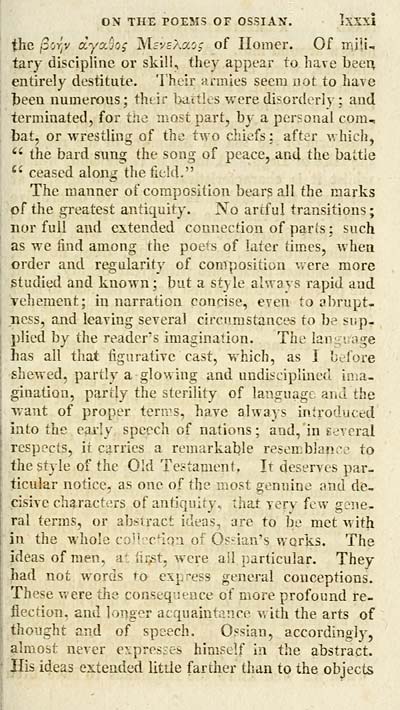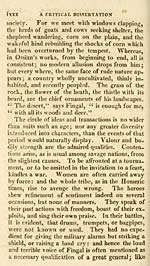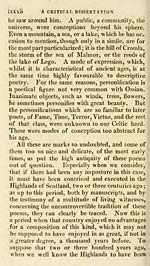Ossian Collection > Poems of Ossian > Volume 1
(99)
Download files
Complete book:
Individual page:
Thumbnail gallery: Grid view | List view

0\ THE POEMS OF OSSIAN. IxXXl
the p'j-f^v dyySjo; Ahvs/.ao; of Iloincr. Of mili-
tary discipline or skill, they appear to have been
entirely destitute. Their nrmies seem not to have
been numerous ; their bartles were disorderly ; and
terminated, for tiie most part, by a personal com-,
bat, or wrestling of the two chiefs ; after which,
'' the bard sung the song of peace, and the battle
" ceased along the field."
The manner of composition bears all the marks
of the greatest antiquity. No artful transitions ;
nor full and extended connection of parts; such
as we find among the poets of later times, when
order and regularity of composition v,ere more
studied and known ; but a style always rapid and
Tehemcnt; in narration concise, even to abrupt-
ness, and leaving several circumstances to be sup-
plied by the readers imagination. The language
has all that figurative cast, vrhich, as I before
shewed, partly a glowing and undisciplined ima-
gination, partly the sterility of language and the
want of proper tenrs, have always introduced
into the eaily speech of nations; and, in g-iveral
respects, it carries a remarkable resemblance to
the style of the Old Testament, It deserves par-
ticular notice, as one of the most genuine and de.
cisive cha,racters of antiquity, that very few gene^
ral terms, or abstract ideas, are to be met with
in the whole colkctiQn of Ossian's works. The
ideas of men, at {ii;st, were all particular. They
had not words to express general conceptions.
These were the consequence of more profound re-
flection, and longer acquaintance v» ith the arts of
thought and of speech. Ossian, accordingly,
almost never expresses himself in the abstract.
■ His ideas extended little farther than to the objects
the p'j-f^v dyySjo; Ahvs/.ao; of Iloincr. Of mili-
tary discipline or skill, they appear to have been
entirely destitute. Their nrmies seem not to have
been numerous ; their bartles were disorderly ; and
terminated, for tiie most part, by a personal com-,
bat, or wrestling of the two chiefs ; after which,
'' the bard sung the song of peace, and the battle
" ceased along the field."
The manner of composition bears all the marks
of the greatest antiquity. No artful transitions ;
nor full and extended connection of parts; such
as we find among the poets of later times, when
order and regularity of composition v,ere more
studied and known ; but a style always rapid and
Tehemcnt; in narration concise, even to abrupt-
ness, and leaving several circumstances to be sup-
plied by the readers imagination. The language
has all that figurative cast, vrhich, as I before
shewed, partly a glowing and undisciplined ima-
gination, partly the sterility of language and the
want of proper tenrs, have always introduced
into the eaily speech of nations; and, in g-iveral
respects, it carries a remarkable resemblance to
the style of the Old Testament, It deserves par-
ticular notice, as one of the most genuine and de.
cisive cha,racters of antiquity, that very few gene^
ral terms, or abstract ideas, are to be met with
in the whole colkctiQn of Ossian's works. The
ideas of men, at {ii;st, were all particular. They
had not words to express general conceptions.
These were the consequence of more profound re-
flection, and longer acquaintance v» ith the arts of
thought and of speech. Ossian, accordingly,
almost never expresses himself in the abstract.
■ His ideas extended little farther than to the objects
Set display mode to: Large image | Transcription
Images and transcriptions on this page, including medium image downloads, may be used under the Creative Commons Attribution 4.0 International Licence unless otherwise stated. ![]()
| Early Gaelic Book Collections > Ossian Collection > Poems of Ossian > Volume 1 > (99) |
|---|
| Permanent URL | https://digital.nls.uk/77947405 |
|---|
| Shelfmark | Oss.79 |
|---|---|
| Additional NLS resources: | |
| Attribution and copyright: |
|
| Description | " ... to which are prefixed, 'Dissertations on the aera and poems of Ossian translated by James Macpherson'". |
|---|---|
| Shelfmark | Oss.79-80 |
| Additional NLS resources: | |
| Description | Selected books from the Ossian Collection of 327 volumes, originally assembled by J. Norman Methven of Perth. Different editions and translations of James MacPherson's epic poem 'Ossian', some with a map of the 'Kingdom of Connor'. Also secondary material relating to Ossianic poetry and the Ossian controversy. |
|---|
| Description | Selected items from five 'Special and Named Printed Collections'. Includes books in Gaelic and other Celtic languages, works about the Gaels, their languages, literature, culture and history. |
|---|

